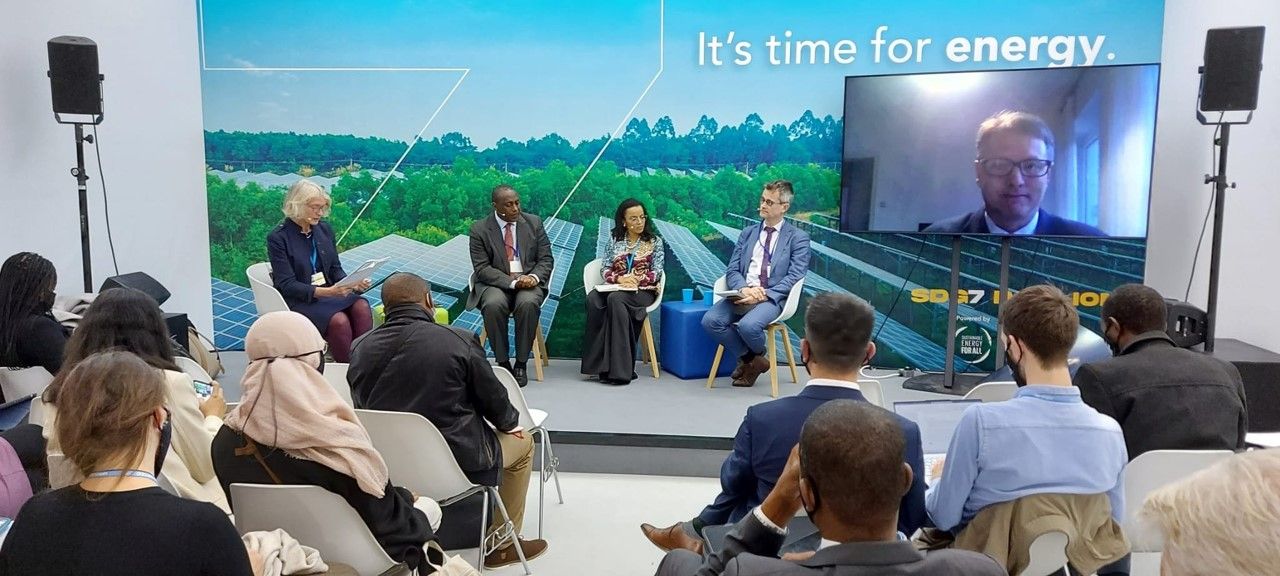Mainstreaming Energy and Climate Cooperation Can Strengthen Africa-Europe Partnership

On the 2nd of November 2021 the COP26’s Sustainable Development Goal 7 (SDG7) pavilion hosted a dialogue on “Target 2030: Reinforcing the Africa-Europe Energy Partnership”. The side event brought together African and European experts to discuss the energy partnership between both continents, and how to best support the achievement of the 2030 Agenda for Sustainable Development. The dialogue highlighted the key diverging, and converging issues at the core of the bicontinental partnership, as well as the opportunities such a partnership may offer.
Following opening remarks by Camilla Toulmin, Senior Fellow, Africa-Europe Foundation, the dialogue dived straight into the assessment of Africa-Europe relations on energy, and what is needed to advance progress by 2030. The insight provided by Johan van den Berg, Head of Secretariat, Africa-EU Energy Partnership (AEEP) connected the result from the European Financial Flows on SDG7 to Africa report, commissioned by the AEEP, with the need to mainstream climate and energy to ensure a partnership of equals. Given the hunger for solutions, the AEEP recently incorporated voices from the private sector, academia, and civil society during the AEEP Forum 2021 – Aligning Energies for a Green and Prosperous Africa. The Forum aimed to help shape the future of Africa and Europe’s collaboration, and van den Berg encouraged others to follow suit.
The panellists, including Magdalena Kouneva, Director-General, Renewable Energy and Energy Efficiency Partnership (REEEP), agreed that one of the main challenges in Africa’s energy development is the lack of capital. The first pool of capital to create a new project is hard to come by in Africa. Capital is, however, not the only hurdle, projects must also be bankable. Bankable projects are extremely difficult due to their multidimensionality. The bankability challenge goes beyond just creating an initial pool of capital, projects must also ensure they are capable of fulfilling the necessary conditions needed in order to be considered bankable. Moreover, Africa’s diverse currencies present an additional challenge. Since African countries have some of the most volatile currencies in the world, projects must be set forth in local currencies, because solutions in dollars or euros are unsustainable due to the frequent fluctuations.
Africa and Europe must build value both ways
Another key point by Kandeh Yumkella, Co-chair, Africa-Europe Foundation Strategy Group on Sustainable Energy, was that Africa does not want to merely be the receptor of European aid, but rather an active participant in the mutual relationship by way of producing batteries, or being part of the value chain producing the technology needed in Europe. Additionally, the panellists agreed that Europe must take Africa seriously to build value both ways. Europe has to show the importance of the bicontinental partnership by way of the energy example. This in turn will showcase energy as a positive contribution for Africa-Europe relations.
Nonetheless, there’s still a large area of opportunity in terms of energy technology. Tariye Gbadegesin Managing Director, ARM-Harith Infrastructure Investment LTD, spoke about the challenges the continent faces if it wants to supply Europe with clean energy. Africa doesn’t have the money, technology or infrastructure to consider a no-carbon future just yet, and it needs to turn its focus towards bridge solutions between gas and solar systems. However, Sébastien Treyer, Executive Director, Institute of Sustainable Development and International Relations (IDDRI), added that it’s important to not get locked into using gasbut rather transition towards cleaner forms of energy,
Finally, the panel discussed their expectations for the upcoming AU-EU Summit next year, and how it will serve as an opportunity to bring more voices into the climate and energy discussion, in order to move beyond talking about energy to acting on it.
The COP26 Summit
The COP26 summithas brought international partners together to take forward action towards the goals set forth in the Paris Agreement and the UN Framework Convention on Climate Change. By way of forums such as the SDG7 pavilion, the summit highlights the importance of goals such as limiting global warming to 1.5 degrees and asks countries to come forward with ambitious 2030 emissions reductions targets (NDC’s) in order to reach net zero by mid-century. COP26 is also encouraging countries affected by climate change to protect and rebuild natural communities and habitats in order to build resilience, before more people lose their lives or livelihoods. To realise the aforementioned goals, it is imperative that developed countries and international financial institutions aid in the process of mobilising climate finance, whilst always adhering to the Paris Rulebook, the rules needed to implement the Paris Agreement.





